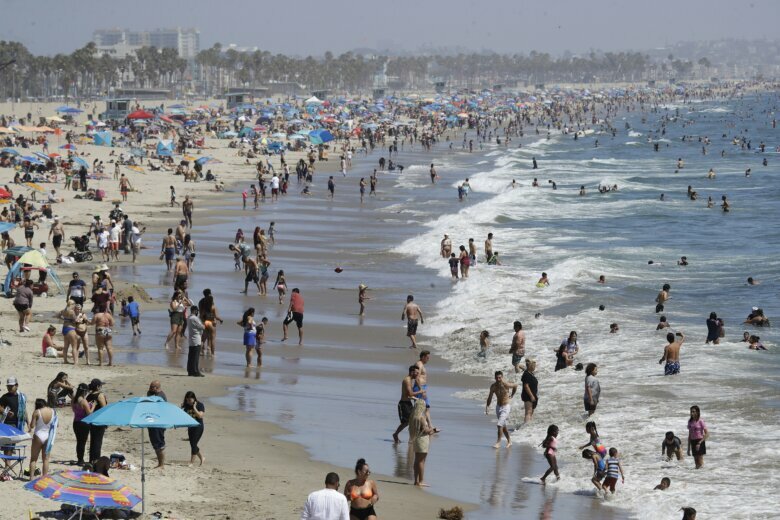
Deirdre Lawson was living her best life before the pandemic — if she wasn’t traveling, she was going to concerts, movies or doing other activities with friends — often at the spur of the moment.
“Then 2020 hit and the universe says, ‘Hey, I got something for you,'” she told CNN.
Like millions of Americans, Lawson has been mostly locked down at home since last March with her 87-year-old mother, who she cares for, and her active social schedule came to a screeching halt.
The 57-year-old conflict analyst has been able to do most of her work from her Atlanta-area home. On the rare occasions she did have to go to the office during the peak of the pandemic, she would get up at four or five in the morning, so she could get her work done and leave before other people came in.
Things have opened up in Georgia, like in much of the country, as states have eased or lifted mask mandates and social distancing requirements, and more and more people are fully vaccinated against Covid-19.
Tracking Covid-19 vaccines in the US
That’s creating new anxiety for Lawson, who has been slow to return to her old life.
“I’m vaccinated. I’m fully vaccinated, but I guess I’m just pandemic shy right now,” she said. “I want to go to the movies so bad, but I’m just like ‘eww, no not yet.'”
About 141.6 million people in the United States, or 42.6% of the country’s population, are fully vaccinated as of Thursday, according to Centers for Disease Control and Prevention data. But 61.5% of people over 12 have gotten at least one dose of the vaccine and 50.5% are fully vaccinated.
Lawson said her office is still trying to decide when employees will return full time, but she is going into the office more often.
That takes extra coordination with her coworkers, Lawson said, because only one member of her team can come in at a time.
“I feel like I’m playing chess, human chess,” she said. “And it’s always a moving chessboard.”
Lawson said her team has to file daily reports, so she knows her bosses know they’re getting their work done, but it still feels weird to be at home when other colleagues are working at the office more regularly.
“You’re trying to gauge the temperature in the office too,” she said. “So it’s a constant, like juggling, a constant balancing act.”
Clinical psychologist Vaile Wright, the senior director of health care innovation at the American Psychological Association told CNN that it’s natural for people to feel uneasy when so much is up in the air.
“There’s just a lot that we know is going to look different, like the workplace, like health care, like schools, but we don’t know exactly what they’re going to look like,” she said. So I think it’s that sort of unknown that’s still causing people to feel distressed.”
She said an APA survey conducted earlier this year found that about half of adults — both vaccinated and unvaccinated — reported feeling anxiety or discomfort about returning to their pre-pandemic lifestyle.
The suddenness of the reopening can also be a source of stress, even for people who are excited for life to get back to normal.
“We’ve been told for the last year that you have to wear a mask to protect yourself, and now we’re being told you don’t,” she said. “And so even though that might follow the science and it might seem logical, it might not feel very comfortable right away, and for some, it might never feel comfortable.”
Some of the most mundane pre-pandemic activities can feel weird or uncomfortable.
Bret Adams, 59, of Austin, Texas, hadn’t been around many people other than his dad since the pandemic began.
Adams said they recently met up with one of his buddies from college after they’d all been fully vaccinated.
“We shook hands and it felt really awkward,” Adams told CNN. “It sounds strange to say that, but I haven’t shaken hands for over a year with anybody, you know, and that’s a normal thing for us to do.”
He works for the state of Texas and said his coworkers just started returning to the office at 75% capacity, or a maximum of 10 people per department, at the beginning of June. They’re planning to be back in the office full time in September.
Adams said he felt anxious about the change because he’d gotten used to working at home.
“I’m fully vaccinated, so I feel at ease more. So is my dad, he’s 84 and I feel more at ease the fact that he’s fully vaccinated,” Adams said. “But it’s just that anxiety of trying to find that middle ground being respectful of other people and hoping that they’ll be the same way back.”
He said he doesn’t know if things will ever get back to normal because this pandemic has been a once-in-a-lifetime thing.
“I hope we can get as close as possible,” he said.
Lisa Reid said her anxieties have eased and she’s feeling more confident as the vaccination rates go up and the number of Covid-19 cases drop in Annapolis, Maryland, where she lives with her husband and two of their three adult children.
Reid, 55, describes herself as an extrovert and says she loves entertaining. She was excited to throw her first post-vaccination gathering last month with a few friends and neighbors.
She and her husband Steve celebrated their 30th anniversary recently by going out for a real, sit-down dinner at a restaurant.
“The pandemic has just been the lens through which we have seen our lives for a whole year or more,” she said. “I recall feeling just like a normal person having a nice meal, so that was a welcome relief.”
She said she was a little unsure, at first, about whether she should wear a mask until she got to the table.
“I have to admit, I ended up quickly putting it out of my head and feeling like a normal human being, and that was really awesome,” she said.
Reid said she’s reasonably confident that most of the people she encounters are vaccinated, but she still keeps a mask with her at all times.
She said she’s getting ready to fly to Florida for a beach weekend with her mother-in-law and sisters-in-law — something she wouldn’t have considered not too long ago.
Wright recommended that people who are feeling uncomfortable as things reopen should take small steps like going to the grocery store or having dinner with a small group of friends to help prepare.
She said people will adjust at their own pace, so they shouldn’t be too hard on themselves or others.
“I think we’ve seen a lot of judgment over the last year, a lot of criticism of how people are living their lives and approaching the pandemic and I don’t think that that’s very effective,” she said.
Lawson said she’s tried to focus on being grateful for the good things in life and is taking a lot of small steps, by getting out and exercising.
“I’m a FitBit user. I pride myself on (taking) a minimum of 10,000 steps each day — usually more than that — and then the pandemic came and all of that just stopped,” she said. “Now I’m back. The days I hit 10,000 steps I’m like ‘Yay me! Go me!'”








